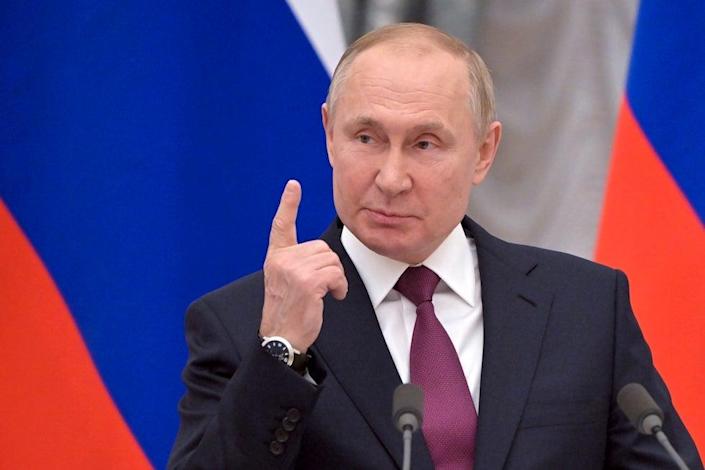
Happy Monday! Welcome to Overnight Defense & National Security, your nightly guide to the latest developments at the Pentagon, on Capitol Hill and beyond. Subscribe here: thehill.com/newsletter-signup.
Russian President Vladimir Putin recognized the independence of two separatist regions in Ukraine as the West fears Putin will invade the former Soviet state at any moment.
We’ll break down the ramifications of this move, plus China imposing sanctions on U.S.-based defense contractors over a recent weapons deal with Taiwan.
For The Hill, I’m Jordan Williams. Write to me with tips at jwilliams@thehill.com.
Let’s get started!
Putin recognizes Ukraine’s breakaway regions


Russian President Vladimir Putin on Monday recognized as independent two breakaway territories in eastern Ukraine.
In signing the decrees recognizing the Donetsk Peoples Republic and Luhansk People’s Republic, Putin rejected diplomatic efforts to cease fighting and pledged more assistance to separatists battling Ukrainian forces.
The move is likely to set up a confrontation with Kyiv and its Western allies, which are poised to push back on potential large-scale Russian military aggression.
Swift condemnation: European leaders swiftly condemned Monday’s move as a violation of international law.
“The recognition of the two separatist territories of #Ukraine is a blatant violation of international law, territorial integrity of Ukraine and the #Minsk agreements,” European Commission President Ursula von der Leyen tweeted. “The EU and its partners will react with unity, firmness and with determination in solidarity with Ukraine.”
German Chancellor Olaf Scholz also condemned the move as a “one-sided breach” of the Minsk agreement, which tamed the hostilities in the Donbas region, reported Reuters. According to CNN, Putin told Scholz of his intent during a call on Monday.
British Prime Minister Boris Johnson also said the move was “plainly in breach of international law. It is a flagrant violation of the sovereignty and integrity of Ukraine.”
The U.S. responds: Following Putin’s actions, the White House said President Biden would sign an executive order that prohibits new investment, trade and financing by people to, from, or within the separatist regions.
The executive order, detailed shortly after Putin delivered his speech, will also give Biden the power to “impose sanctions on any person determined to operate in” the so-called Donetsk and Luhansk people’s republics.
“To be clear: these measures are separate from and would be in addition to the swift and severe economic measures we have been preparing in coordination with Allies and partners should Russia further invade Ukraine,” White House press secretary Jen Psaki said in a statement. “We are continuing to closely consult with Allies and partners, including Ukraine, on next steps and on Russia’s ongoing escalation along the border with Ukraine.”
An uptick in fighting: Fighting has escalated in the Donbas in recent days, with U.S., Ukrainian and other European officials placing blame on Russian-backed separatists for provoking violence, including the shelling of a kindergarten in the region, and praising Ukrainian forces for restraint.
The increase in fighting is coupled with warnings from the U.S. and its allies and partners that Russia seeks to manufacture a “false-flag” operation to create a pretext for Russia to invade Ukraine and would launch a large-scale invasion with nearly 200,000 troops that includes removing the Ukrainian government in Kyiv.
Peacekeeping operations: According to multiple reports, the decree that Putin signed ordered the Russian military to perform “peacekeeping operations” in the separatist regions.
However, according to The Associated Press, it was unclear when exactly those operations would begin.
Check out today’s coverage of the Russia-Ukraine conflict:
China slaps sanctions on defense contractors


China is imposing sanctions on two U.S. defense contractors over a pending $100 million arms sale to Taiwan announced earlier this month.
Chinese foreign ministry spokesperson Wang Wenbin told reporters on Monday that Beijing will sanction Raytheon Technologies and Lockheed Martin, saying the companies are “military industrial enterprises that have long participated in the U.S.’ arms sales to China’s Taiwan region.”
The sale in question: The State Department notified Congress of the weapons sale earlier this month. It was requested by the Taipei Economic and Cultural Representative Office (TECRO) in the U.S., Taiwan’s de facto embassy in Washington. TECRO asked for support to sustain and improve its U.S.-made Patriot Air Defense System.
Raytheon and Lockheed Martin are listed as prime contractors for the agreement.
Deeper than one deal: The U.S. takes a position of strategic ambiguity when it comes to Taiwan. It formally recognizes Taiwan as part of China, but still maintains unofficial ties with the island and commits to ensuring it can defend itself.
China sees Taiwan as its own territory and has recently increased pressure on the island.
Wenbin said on Monday that the deal “seriously [violates] the one-China principle and the stipulations of the three China-US joint communiqués,” adding that it “gravely undermine China’s sovereignty and security interests, and severely harm China-US relations and peace and stability across the Taiwan Strait.”
“China firmly opposes and strongly condemns this,” he added.
Something to watch for: Former Secretary of State Mike Pompeo will travel to Taiwan next week, more than a year after China sanctioned him and several other U.S. officials for allegedly violating “China’s sovereignty.”
Pompeo and his wife will visit Taiwan between March 2-5, Reuters reported, citing the country’s foreign ministry. Pompeo is reportedly scheduled to meet with Foreign Minister Joseph Wu and deliver a speech at a think tank.
Taiwan’s foreign ministry called Pompeo a “long-term and staunch friend” of the country.
“Former Secretary of State Pompeo is a long-term and staunch friend of Taiwan and made outstanding contributions to promoting Taiwan-U.S. relations during his time in office,” the ministry said in a statement, according to Reuters.
COMING SOON FROM THE HILL
Morning, Noon, and Night. Be among the first to receive The Hill’s Evening Report. Sign up here.
Navy planning drone fleet in Middle East


The U.S. Navy is planning to launch a fleet of unmanned drones in the Middle East together with allied nations.
Vice Adm. Brad Cooper, commander of U.S. 5th Fleet, told The Associated Press that 100 unmanned drones would increase surveillance capabilities of the Navy so it can better monitor areas important to the flow of oil and shipping.
Cooper said he hoped the drones would be operational by the summer of 2023. It wasn’t clear which nations would join the U.S. in the fleet.
About 5th Fleet: 5th Fleet’s area of operations spans 2.5 million square miles and includes the Strait of Hormuz, the Suez Canal and Strait of Bab el-Mandeb in Yemen.
The Navy last week concluded a large-scale international maritime exercise in the Middle East, which spanned across the Arabian Gulf, Arabian Sea, Gulf of Oman, Red Sea and North Indian Ocean.
Tense times: Cooper told the AP that it is “well established” that Iran is the primary regional threat the U.S. is addressing.
The AP noted that since former President Trump pulled the U.S. out of the Iran nuclear deal, vessels in the region have been targeted by Iranian forces and other suspicious attacks. Further complicating matters is that Iran-backed Houthis have dispatch drone boats toward Saudi Arabia’s waters.
Meanwhile, there had also been a series of encounters between Iranian and American naval forces.
ON TAP FOR TOMORROW
Ukrainian Foreign Minister Dmytro Kuleba will participate in a conversation with The Atlantic Council at 12:30 p.m.
WHAT WE’RE READING
Well, that’s it for today! Check out The Hill’s defense and national security pages for the latest coverage. See you on Tuesday.




